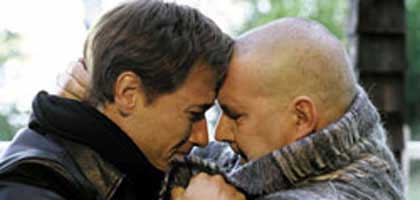
The Last Laugh
Film of the Month: The Barbarian Invasions

Denys Arcand's The Barbarian Invasions is a return to form. Philip Kemp celebrates a film that tackles death with subversive optimism.
Forget John Travolta and Robert Evans: Denys Arcand must qualify as cinema's supreme Comeback Kid. The career of the French-Canadian film-maker has traced a roller-coaster pattern, from the depths of official disfavour (some of his early documentaries ruffled influential feathers in Canada) to the heights of international acclaim with such films as The Decline of the American Empire (1986) and Jesus of Montreal (1988), then down again to the doldrums of neglect. Now, after three underwhelming offerings ( Love and Human Remains , 1993; Joyeux Calvaire , 1996; Stardom , 2000), Arcand has hit the heights again. The Barbarian Invasions ( Les Invasions barbares ), garlanded at Cannes and elsewhere, finds him back on form.
Invasions comes as a follow-up to American Empire , picking up many of the earlier film's characters (played by the same actors) 17 years on. A follow-up, not a sequel: it's not necessary to have seen the first film to enjoy the new one, though viewers' appreciation will surely be enhanced if they have. Rémy (Rémy Girard), the most sexually unrestrained of the earlier group, now lies dying of cancer in the crowded public ward of a Montreal hospital; his estranged son Sébastien (stand-up comedian Stéphane Rousseau, making his screen-acting debut), a futures trader based in London, returns to make his father's last weeks more tolerable.
Both films share Arcand's ironic, irreverent tone; though his own political sympathies are generally leftwards, he pokes fun at sacred cows on the left as well as on the right. (Canada's vaunted Medicare system comes in for some drubbing, and union officials are shown as blatantly venal.) At one point the dying Rémy and his friends ruefully recite a litany of the fashionable 'isms' they once embraced: Marxism, Freudianism, Maoism, Situationism... All they're left with now, it seems, is hedonism - the determination to live, and die, as comfortably as possible.
The 'barbarians' of the title can be taken in two ways. On the one hand it's an extension of the metaphor of Arcand's earlier film: once an empire is in decline, the barbarians start crossing the frontier, and we're shown footage of the 11 September events with a television pundit describing them as the first of the "barbarian attacks" on the US. But it's also the term Rémy uses for Sébastien, whom he claims never opens a book and is interested only in accumulating money. "My son is a capitalist, ambitious prude," he laments, "when all my life I've been a socialist, hedonist lecher." But it seems, as in Cavafy's famous poem 'Waiting for the Barbarians', that this particular barbarian may be "a kind of solution". "I voted for Medicare, and I'll accept the consequences," Rémy insists, but he doesn't protest too loudly when Sébastien's lavishly distributed cash buys him a private ward, the company of his friends, a ready supply of pain-killing heroin and as good a death as anyone could wish for. In the end the two are reconciled, with the dying man hoping that Sébastien may have "a son as fine as you".
A son reconciling with his dying father - it's hardly fresh cinematic territory and could easily have turned banal or maudlin. Arcand avoids both traps, thanks to the subversive wit and intelligence of his script and the generosity of spirit he displays towards his characters. In an interview about American Empire some ten years ago he observed: "Beyond differences of gender, of age, of sexual orientation, they are all friends. There is a certain gentleness, a certain civility about the characters that counterbalances their cynicism. And it was part of the context of the production as well... If the audience does not care about the characters there is no film." The same, and even more so, goes for Invasions .
In some quarters the film has been criticised for being too talky - but when the talk is this entertaining, and flows with such a sense of relaxed spontaneity, it seems churlish to complain. Not least of the pleasures of Arcand's script is his taste for sophisticated bawdy. During the last, companionable evening by the lake, on the eve of Rémy's death, someone mentions the late-19th-century French president Félix Faure, who died of a heart attack while being fellated by his mistress. This sparks off a whole string of increasingly ingenious puns on the slang term pomper (to suck off) - rather lost, inevitably, in the subtitles.
Frequently Arcand teases his audience by switching moods on us, from cynical to affirmative and back. In a flashback Rémy recalls his last day's teaching at college, and how hurt he felt by his class' indifference to his departure. So he's delighted when three of his students (two male and one female) show up at his bedside to tell him how much they miss him and his classes. They leave - and in the anteroom Sébastien pays them off. But the young woman, her conscience touched by the warmth of Rémy's gratitude, refuses to take the money. This episode reflects in miniature the progression of the whole film - moving tentatively, and with many a sardonic shrug, towards its affirmative conclusion. And the cold blues and greys that predominate in the early hospital sequences imperceptibly give way to warmer, gentler tones until we arrive at the idyllic lakeside surroundings of Rémy's easeful death.
Given that it deals with themes of death and social decline, Arcand's film could easily have been a depressing experience. "The history of humanity, sister," Rémy tells a nun who tries to dispense uplift, "is a history of horrors." He regards himself as "a total failure" and the upcoming generation as illiterate, or at best post-literate. As ever with Arcand, Catholicism can offer scant comfort and seems paralysed in the face of its own loosening hold. In one of the film's most sardonic scenes Sébastien's art-valuer fiancée Gaëlle is shown round a cellar packed with surplus-to-requirements religious artefacts by a priest, who hopes the Church might be able to sell them off. She has to tell him that they're worthless stuff. Official religion is as bankrupt as the trendy isms that Rémy and his friends once adhered to.
Yet in the face of all this, Invasions is ultimately a gracious, even sweet-natured film, optimistic almost despite itself. Parallel with Rémy's progression from bilious despair towards a serene death runs the rehabilitation of Nathalie (an eloquent performance from Marie-Josée Croze, who won the Best Actress award at Cannes), the junkie daughter of his one-time lover Diane. At first seeing her as a mere convenience, a source for the heroin he wants for his father, Sébastien comes to feel for her as a person, if only because their needs coincide - he must help her liberate herself from the drug so he can rely on her to give Rémy his regular dose. At the same time, her growing regard for both father and son gives her the impetus to regain control of her life, to the point where Sébastien can hand over to her not just Rémy's apartment but his prized library, making her his cultural heir. (Here again Arcand sidesteps the banal by not having Sébastien and Nathalie fall into bed together.) When all the creeds and isms have failed, Arcand reminds us, human companionship and affection remain.
